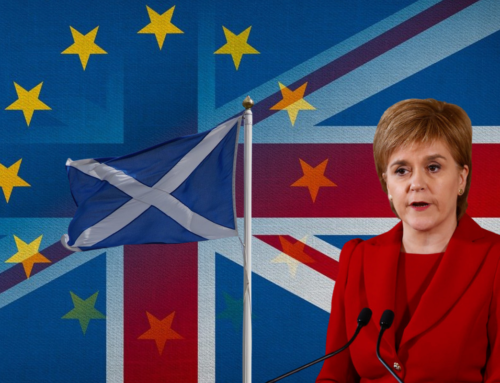by Monica Threlfall (writing in a personal capacity), Reader in European Politics, London Metropolitan University
The Leave people are always saying they want “our sovereignty back“. But for what purpose? What is this sovereignty and for whom is it supposed to work? Not for ordinary people. Sovereignty is a concept that power-lovers cling to when they fantasize they might get more power thereby. What is the point of ‘sovereignty’ if a post-exit sovereign government abolishes the obligation not to discriminate against women or minorities (as a right-wing US state is now trying to do), removes most health and safety precautions at work, or allows companies to sack workers when they take over firms or privatised services? More workplace accidents and deaths are the cost of sovereignty in the wrong hands. Today EU member states are enjoying a steady decline in morbidity at work ever since joint laws were adopted, and the UK had to adhere to them too. Britain was performing well until Conservative-led governments started to find corners to cut despite the laws. Yet the Leave campaign is full of people who seethe over such protections – even Cameron launched his referendum vowing to get an opt-out from the Working Time Directive so that employers could lengthen working hours, cut holidays, paternal and parental leave, and more. But the member states said no to him over that, so we remain protected while we remain in the EU.
‘Sovereignty’ as control of UK borders is another diversion tactic of the Leave campaign. Britain has a history of inviting hard-working and skilled people (‘immigrants’) from the former colonies to live here and run our essential services for us. At the time, many screamed “Britain is full!” but they turned out to be a great cultural and economic asset to us. So too the Irish. Let’s remember Britons also have a long history of preferring to live ‘abroad’ themselves, and didn’t meet closed doors. Worse, fleeing famine at home, millions emigrated to the USA and Australia and crushed the indigenous populations that stood in their way. The numbers wanting to come and live here now are minute in comparison.
European and world history is plagued with the drives of men to establish more, new, better geographical sovereignties, leading to largely pointless millions of deaths over border issues.
It was in order to put an end to that kind of competitive search for bigger sovereignties that the EU was built. Six European nations were long-sighted enough to realize that by coming together to pool their small-scale sovereignty, the bigger sovereignty of an indefinite, reliable peace could quickly be achieved. The EU member-states have maintained full and lasting acceptance of each other’s borders without suffering loss of power and decision-making ability. For there is no greater power than that of exercising the skill of political consensus across an ever larger number of independent nations.
It is precisely because no EU member questions the other countries’ borders that the members can grow together in the ways they have sovereignly chosen. They remain fully aware that they are separate countries with their own language (spending millions on translation so as to avoid the feeling of being dominated by English and the British), and on preserving each country’s cultural heritage. In this context, there is no need for member- states to be afraid of adopting similar laws or pushing for convergent trends if these improve the living conditions of the majority of people. A better life for all is a chief goal of the EU in its Treaties that member-states are committed to adhere to.
The Leave group insists that exit is the way to recover sovereignty, but seem in denial about the fact that all decisions in the EU are taken with the full participation of the UK. We are present in every one of its institutions, and have been granted opt-outs over border controls (‘Schengen’), the euro, and the aim of an ‘ever closer Union’ by the other member-states. And when the Leavers are acute enough not to deny that the UK is present behind all the formal laws that get adopted in the Council of Ministers and Parliament (Directives), they lament that the UK has not managed to become dominant enough to overrule other nations at these gatherings. A fixation with sovereignty as state dominance overlooks the main question which is: who is to exercise sovereignty, and for whom?
The Leavers fail to perceive the miracle that the UK is part of a series of negotiations that led to a consensus between 28 countries. A miracle, not a loss, and a first in history. We can be proud of this. The EU is more important for our wellbeing than NATO. Let us celebrate the fact that British Prime Ministers Ted Heath and Harold Wilson realised the advantage of joining in 1973/75, because they saw that Britain had to be part of the new, unique, project of peace forever that was the EU’s long-term project.
Instead of being constructive leaders in the EU, our governments have too often given the impression they get a kick out of disagreeing, and demanding exceptions be made for Britain, forgetting the purpose of our being members is to join in that consensus-making between European nations. Even now some INners refer to Britain ‘leading’ in Europe. They shouldn’t. The appropriate behaviour is not to act like an only child in a large family of siblings!
The EU is no country’s vanity project. Perhaps this is what the Leavers can’t stand? After all, nothing prevents the Leavers from accepting that Britain could be a conciliatory nation that thinks of the welfare of its people and those of its neighbours, together in a Union of states. Instead, we hear laments for lack of dominance by Britain. Instead, Leavers prefer to risk being left with a Little England bereft of Scotland and possibly even Northern Ireland as long as they can feel ‘sovereign’ over a small island and subject its people to their will.
Yes, the Remain position is that we can willingly endorse shared and pooled sovereignty because so far it has got the best results for our people. The Treaty of Rome of 1957 opened the way to an era of overall social development and increased economic wellbeing until the financial crisis of 2008 that was engineered by power-hungry men in banks in the USA. So, why try to turn the clock back? Forward is the way to solve the current destructive over- dominance of corporations and the extra-terrestrial rich over our world. In this the already powerful EU is a great tool at our disposal.
Let us never forget the more than 100 million soldiers, women, and children who died in 2 world wars just a hundred years ago. The EU is the most advanced co-operative structure of independent nations in the world to date. We can be proud to be a member and excited about making our participation more active and creative in the future – if we REMAIN.







